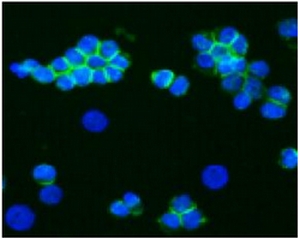CD56 (NCAM1) Mouse Monoclonal Antibody [Clone ID: RNL-1]
Other products for "NCAM1"
Specifications
| Product Data | |
| Clone Name | RNL-1 |
| Applications | IF, IHC, WB |
| Recommended Dilution | Immunocytochemistry. Immunohistochemistry on frozen sections. Recommended dilutions: 1/100- 1/200 for immunohistochemistry with fluorochrome conjugated secondary antibodies or avidin-biotinylated horseradish peroxidase complex (ABC) as detection reagent. For Immunoblotting applications the antibody has been used with previous lots at a 1/100-1/1000 dilution. |
| Reactivities | Human, Mouse, Rat |
| Host | Mouse |
| Isotype | IgG1 |
| Clonality | Monoclonal |
| Immunogen | Small cell lung cancer cell line NCI-H82 |
| Specificity | This clone was defined as a cluster I antibody during the Second International Workshop on Small Cell Lung Cancer (SCLC) Antibodies. RNL-1 recognizes the extracellular region of NCAM / CD56, which is present in small cell lung cancer (SCLC) and lung carcinoids. This antibody reacts with normal neural tissues and endocrine glands, such as pancreatic islet, pituitary gland and adrenal medulla. Expression was also found in Leydig cells of the testis, in the thyroid and in smooth-muscle cells of the small intestine, colon and bladder. The antibody is a valuable marker for the characterization of several neuroendocrine tumors. |
| Formulation | PBS State: Purified State: Liquid purified IgG fraction Preservative: 0.09% Sodium Azide |
| Concentration | lot specific |
| Conjugation | Unconjugated |
| Storage | Store undiluted at 2-8°C for one month or (in aliquots) at -20°C for longer. Avoid repeated freezing and thawing. |
| Stability | Shelf life: one year from despatch. |
| Gene Name | neural cell adhesion molecule 1 |
| Database Link | |
| Background | NCAM, as a member of the immunoglobulin superfamily of adhesion molecules is characterized by several immunoglobulin (Ig)-like domains. The extracellular part of NCAM consists of five of these Ig domains and two fibronectin type III homology regions. NCAM is encoded by a single copy gene composed of 26 exons. However, at least 20-30 distinct isoforms can be generated by alternative splicing and by posttranslational modifications, such as sialylation. During sialylation, polysialic acid (PSA) carbohydrates are attached to the extracellular part of NCAM. Through its extracellular region, NCAM mediates homophilic interactions. In addition, NCAM can also undergo heterophilic interactions by binding extracellular matrix components, such as laminin, or other cell adhesion molecules, such as integrins. NCAM can be found in central and peripheral nerve cells, neuroendocrine tissues and at the surface of NK-cells. Also, NCAM is present in malignancies derived from these tissues and cells. |
| Synonyms | NCAM-1, N-CAM-1, NCAM |
| Reference Data | |
Documents
| Product Manuals |
| FAQs |
| SDS |
{0} Product Review(s)
0 Product Review(s)
Submit review
Be the first one to submit a review
Product Citations
*Delivery time may vary from web posted schedule. Occasional delays may occur due to unforeseen
complexities in the preparation of your product. International customers may expect an additional 1-2 weeks
in shipping.






























































































































































































































































 Germany
Germany
 Japan
Japan
 United Kingdom
United Kingdom
 China
China



